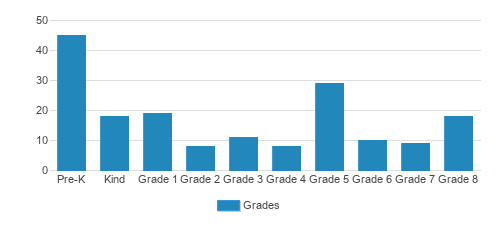The mission of St. Andrew the Apostle School is to build a Catholic environment that promotes excellence in learning and development of the whole person through the Gospel message.
Working with parents, staff and our parish community, we seek to form leaders by guiding our students to their highest levels of spiritual and academic potential.
We offer an environment which encompasses a quality academic curriculum, mutual respect, intellectual curiosity and service to others.
Quick Stats (2025)
- Grades: Kindergarten-8
- Enrollment: 161 students
- Application Deadline: None / Rolling
- Source: Verified school update
School Overview
School Membership(s)School Assoc.
Religious Affiliation
Grades Offered
Grades Kindergarten-8
Year Founded
1959
Student Body
Total Students
161 students
Student Body Type
Co-ed
% Students of Color
54%
State avg.: 34%
Students by Grade

Academics and Faculty
Total Classroom Teachers
10 teachers
Student : Teacher Ratio
16:1
National avg.: 13:1
Tuition and Acceptance Rate
Admission Deadline
None / Rolling
School Notes
- Offer religion four days a week with Mass on Wednesdays
- Small classes of 15-20 students
- Before and After Care available for a fee
- Non-Common Core Math and Language Arts
- Iowa Testing in the Fall; Benchmark testing as needed
- Core subjects: Religon, Math, language Arts, Science, Social Studies
- Specials: Art, music, PE, Rosetta Stone languages, technology,
- Sports: Flag Football, girls Volleyball, Basketball, Co-ed volleyball
- After School activities: Middle school play, game club, chess, Builders Club, chorus, Karate, Student Council
- Use of SMART boards in all curriculum areas
- One-to-One technology usage through chromebooks
Source: Verified school update
Frequently Asked Questions
What schools are St. Andrew The Apostle often compared to?
St. Andrew The Apostle is often viewed alongside schools like St. Mary Immaculate Parish School, Little Explorers Montessori School by visitors of our site.
When is the application deadline for St. Andrew The Apostle?
The application deadline for St. Andrew The Apostle is rolling (applications are reviewed as they are received year-round).
School Reviews
Endorse St. Andrew The Apostle. Endorsements should be a few sentences in length. Please include any comments on:
- Quality of academic programs, teachers, and facilities
- Availability of music, art, sports and other extracurricular activities
- Academic or athletic awards
Recent Articles

A Parent's Guide To Understanding High School Teaching Methods
This comprehensive guide helps parents navigate the various teaching methods used in today's high school classrooms. By understanding these approaches, you'll be better equipped to support your teen's learning journey, communicate effectively with teachers, and create a complementary learning environment at home.

February 08, 2025
Social Emotional Learning: Education's Hidden SymphonyA musician's perspective on Social Emotional Learning reveals how this educational framework orchestrates success through five essential emotional competencies.

January 24, 2025
A Roadmap For Starting A Private SchoolUse this roadmap as a set of talking points with your trusted mentors and professionals to start the private school of your dreams. You're not alone. Over the years, hundreds of folks like you have had the same dream. From Quintilian to Maria Montessori to Lucy Madeira Wing, visionary educators have established schools to teach according to their beliefs and methodologies.


















